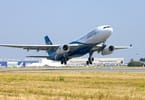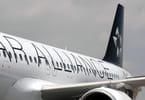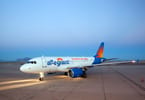With the summer vacation season officially beginning this weekend, the recession-racked travel industry is aiming to lure economically insecure Americans with all kinds of enticing offers, from reduced rates for cruises and resorts to special deals on air fare and free nights at upscale hotels.
Gas prices are considerably lower than last year. And with the dollar regaining some lost ground against European currencies and its continuing strength in many other countries, this is shaping up to be one of the cheapest vacation seasons in years.
Even so, not everyone believes they can afford a big trip — financially or psychologically. People who’ve endured pay cuts or layoffs, or who just feel worried about the economy, their jobs and even airborne pathogens such as swine flu, are expected to be taking more road trips to places closer to home this year.
“Last year, soaring gas prices and economical challenges resulted in far fewer trips being taken than had been forecasted,” said Jim Lehman, senior vice president, AAA East Central. “This summer, significantly lower gasoline prices and plentiful travel bargains are enticing Americans to schedule a much-needed vacation.”
According to AAA’s annual projection for Memorial Day travel, which is considered a good predictor of the summer season to come, some 1.05 million Pennsylvanians were expected to travel this holiday, including 877,000 driving and 65,000 flying to their destination.
The overall number of Americans going away this weekend was expected to increase 1.5 percent from 2008, with 32.4 million taking a trip of 50 or more miles. That’s still a big drop from the 35.3 million who traveled on the same weekend in 2007.
Nearly 83 percent were planning a road trip, more than last year’s holiday, when drivers paid some of the highest fuel prices on record. By contrast, air travel was projected to decline by 1 percent, to 7 percent of all Memorial Day travelers — even though air fares have dropped 4 percent from last year.
Average spending was expected to top $1,000; average distance, 620 miles. Rental car rates were averaging $43 a day compared with $45 last year, and prices at AAA’s three-diamond hotels were expected to be 12 percent lower, or an average of $142.
“There’s definitely a downturn in international travel that has nothing to do with the swine flu because we saw it before that was an issue,” Mr. Lehman said. The change, he said, has more to do with price and the length of time people feel comfortable missing work.
“Some folks just feel it’s not a good time to be away from their job for two weeks,” he said. “There’s a drop to places like Alaska, where the distance is longer and you need more time. People are substituting shorter vacations, maybe long weekends with a Friday and Monday off work, or a week in Florida instead of two weeks in Europe.”
In a recent Associated Press poll, a third of those surveyed said they had already canceled at least one trip this year because of financial concerns. Overall, the poll found that only 42 percent were planning a leisure trip, compared with 49 percent in 2005. Predictably, the higher the household income, the more likely it was that a trip was in the offing.
David Lytle, editorial director of Frommers.com, said those economic concerns were driving a resurgence in regional travel.
“In Pittsburgh, that could mean driving three or four hours to the Smoky Mountains and renting a cabin,” he said. “These are the kinds of trips my family did when I was a child in the Midwest. We’d go to other Midwestern cities based around double-header baseball games, museums or special events like concert series.”
Still, those who have the means and the leeway to travel farther for longer are finding plenty of bargains, said Paul Busang of Gulliver’s Travels.
“We actually have trouble getting through to cruise lines because their offers are so good,” he said. “People are also taking advantage of bargains at land-based resorts and hotels.”
In a recent survey of 600 American Express travel agents, the vast majority said their clients are finding ways to offset costs even more — using credit-card rewards points and frequent-flier miles, booking vacations closer to dates of travel to take advantage of last-minute deals, picking destinations where the dollar goes the furthest, traveling midweek when rates are lowest.
Asked to rank the top cities for the best value, the agents listed domestic destinations such as Las Vegas; Orlando, Fla.; Fort Lauderdale, Fla.; New York; and Los Angeles. Internationally, they picked Rome, London, Paris, Madrid and Prague.
Mr. Lytle said he’s seeing a slight uptick in travel to Europe because of the dollar’s improvement.
“We’re seeing lots of questions about Italy and Ireland,” he said. Eastern European destinations like Poland, Hungary and Romania are also sparking interest because they’re not tied to the euro and are more affordable.
“Cruising was always affordable, but it’s even better now,” Mr. Lytle said. “We saw a one-week Alaska cruise including air fare in and out of Los Angeles for $899. If that’s your kind of travel, it’s a great way to see multiple destinations with all the food and nonalcoholic drinks paid for up front.”
Mexico is off a lot of people’s travel maps this year because of swine flu fears. But Mr. Lytle noted that Peru and Costa Rica remain popular destinations. Argentina, New Zealand and Australia are good values because of the exchange rate, but they also require a lot of travel time. So does Hawaii for those living in the East, which may be why there are some great bargains there.
“Compared to the rest of the world, Americans have fewer vacation days, so they’re a more precious commodity,” he said. “People want to spend as little time in transit as possible.”
Mr. Lytle still likes the national parks as a destination, especially those that are underused. At the top of his list is Lassen Volcanic National Park, about two hours north of Sacramento, which has active volcanic beds, hissing steam holes, boiling mud pots and hot springs.
“It’s one of the least visited parks in the system, but it’s perfect if you’re on a Northern California road trip. Once you’re north of Sonoma and Napa, it’s a whole different world up there.”
WHAT TO TAKE AWAY FROM THIS ARTICLE:
- People who’ve endured pay cuts or layoffs, or who just feel worried about the economy, their jobs and even airborne pathogens such as swine flu, are expected to be taking more road trips to places closer to home this year.
- People are substituting shorter vacations, maybe long weekends with a Friday and Monday off work, or a week in Florida instead of two weeks in Europe.
- Rental car rates were averaging $43 a day compared with $45 last year, and prices at AAA’s three-diamond hotels were expected to be 12 percent lower, or an average of $142.






















